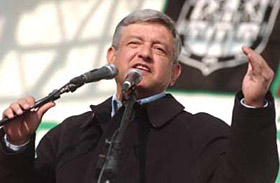 |
 |
 |
 Editorials | June 2005 Editorials | June 2005  
What's This Election Really All About?
 Kelly Arthur Garrett - The Herald Mexico Kelly Arthur Garrett - The Herald Mexico


| | Recent polls showed a clear lead for the PRD's Andrés Manuel López Obrador. |
New polls on the 2006 presidential race came out in two Mexico City newspapers last week and got a lot of attention for the wrong reasons. They showed a clear lead for the PRD's Andrés Manuel López Obrador, the Federal District's chief of government whose title apparently translates into English as "the fiery leftist mayor of Mexico City." You seldom see it written any other way these days.

His slightly increased lead (to 7 percentage points in Milenio, 11 in Reforma) is hardly surprising, given his recent victory over an ill-advised attempt to legally maneuver him out of the race. The martyr effect is still operative, and his popularity has shown no signs of weakening.

Nor are top PAN candidate Santiago Creel's fading numbers particularly stunning. Creel is seen as President Fox's fairhaired boy and chosen successor. It will take him a while to overcome that disadvantage. He took the first step on Wednesday by officially announcing his candidacy for the PAN nomination, and resigning his post as interior secretary in Fox's cabinet.

In the Milenio poll, PRI leader Roberto Madrazo is probably right where he wants to be in second place, the choice of 33 percent of the voters, compared to López Obrador's 40 percent and Creel's 23 percent. That's not a bad spot to pounce from should López Obrador fall or get pushed from his perch.

Much more interesting was the little word-association poll that Reforma tacked onto the horse-race numbers. López Obrador came away with the lion's share of the personality prizes, being identified the most with words like "family," "patriotism," "work" and "truth." ("Fiery leftist mayor" wasn't on the list, or he surely would have nabbed that one, too.)

The only word Creel got most identified with was "religion." That's logical; the PAN is the only party that openly touts its Catholicism. On the other hand, López Obrador got top identification with "guadalupismo," which has to do with the nationalistic Mexican personification of the Virgin Mary. Academe political science and theology departments alike will stay busy for years deciphering that one.

More good news for Madrazo. The word he was most associated with by those polled was "money." As the head of a party famous for its shrewd use of funds to win elections (to wit, the current governor's contest in the State of Mexico), this has to be gratifying.

I would have preferred, though, to see another question put to the polling sample. What might the answers have been if they were asked what this election is really going to be about?

The answer is known. The question is whether it will ever be talked about. Indeed, will it even be mentioned? It certainly won't be what we'll be hearing about during the campaign.

What we'll hear about is who's spending what, who's the biggest fan of democracy, who hates crime and drug traffickers the most. We'll be told countless times who's a closet authoritarian, who's a populist, who's a dinosaur, and who's a crook.

We'll hear accusations of not standing up to the United States. We'll hear accusations of needlessly provoking the United States. Perhaps we'll hear both accusations at the same time.

We'll hear a lot about who built how many housing units, who traveled to where how often, and who paid who what. We'll hear about who's cheating, who's cheating even more, and who's cheating the most.

And of course we'll hear about who's going to lead the country to utter ruin, who's going to send it back to the bad old days, and who's going to give it away to foreigners.

But what we may never hear about, in so many words, is the overarching issue in this election (as opposed to the likes of "poverty must be diminished," which is not an issue but a consensus.) The only meaningful choice the voters have is between the two competing proposals in play for the nation's future.

One goes like this: "The most profitable use of government and its resources is to aid and lift the major private sector players, since their success is the only hope for the nation's poor to truly thrive."

The other goes like this: "The most profitable use of government and its resources is to aid and lift the poor, since improving their condition is the only way for the nation's private sector to truly thrive."

The PAN stands for the first. The PRD promotes the second. The PRI seems willing to take, on any given day, whichever will help it get the presidency back.

Neither is a particularly radical point of view. Each has had its day in the sun. The first has predominated in Mexico since the 1980s. The second has been gaining momentum for the last five years throughout Latin America. Judging from the latest polls, there's considerable support for switching from the first to the second in Mexico.

Whether there will still be enough support on July 2, 2006 for that to actually happen remains to be seen. But it would be an indication of a healthy democracy if the two alternative visions were debated over the next year. Alas, if past is precedent, they'll more likely get ignored in favor of quick-hit television spots linking opponents with Hugo Chávez or Carlos Salinas or even Arnold Schwarzenegger.

Write to the author at: kellyg@prodigy.net.mx | 
 | |
 |



